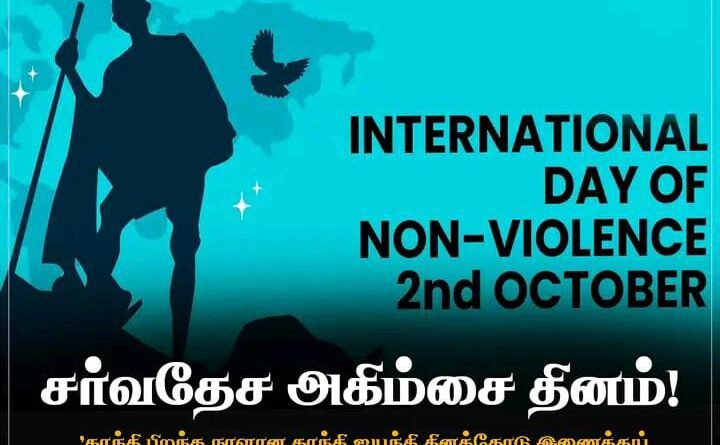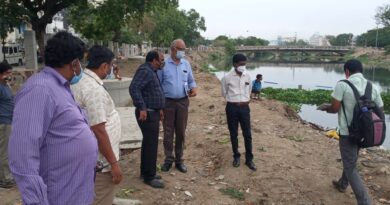oday in History-[ 2- October-]
World Day of Non-Violence is today (02.10.2020) !!!!
Today is Mahatma Gandhi’s birthday.
(2 Oct 1869 – 30 Jan 1948) His birthday is observed as the International Day of Non-Violence.
Truth must be sought through non-violence, non-violence is noble, it is not cowardice, non-violence is like water and fire… different, non-violence is the sign of heroism, freedom from anger, anti-hatred.
The World Day of Non-Violence is observed on October 2 every year as per the United Nations resolution. October 2nd is the birthday of Mahatma Gandhi, the father of the nation of India.
On June 15, 2007, on behalf of India, the United Nations requested that October 2, the birthday of Mahatma Gandhi, be observed as the World Day of Non-Violence. A resolution was brought in the General Assembly. 142 countries supported this resolution. The resolution was passed in the General Assembly. Following this, UN In the statement released, the date of October 2 is UN. It requested member states to observe the International Day of Non-Violence. Gandhi’s birthday, October 2, is a national holiday in India. This day is celebrated annually in India at the national level. All the governments and UN have requested to celebrate this day at the international level. Organizations, non-governmental organizations and individuals under the UN It has requested and requested that this should be observed through curricula and awareness programmes.
At a time when the world thought that rights can only be gained through violence and war, Gandhiji proved it wrong and chased away the British rulers who wanted to hold the world in their hands without arming them. People like Martin Luther King and Nelson Mandela who were attracted by his practices followed the path of non-violence and showed success. ‘Non-violence is not a weapon of the weak.’ The weak choose violence only the strong can walk the path of non-violence. It does not take strength to knock an enemy down; “Strength is needed to overcome any attack and stand up,” Gandhiji’s words are a thought worth pondering.
The first United Nations Day of Non-Violence was observed on October 2, 2007. Mahatma Gandhi, who was responsible for the birth of independent India, was accepted by countless people in a state of tension throughout the world due to tolerance and conflicts It is necessary for us to rethink the methods of non-violence,” said United Nations Secretary-General Ban Ki-moon. At that time, Gandhiji’s non-violent struggle was not only British. , there was strong opposition even in the Congress party. However, he never deviated from his policy till the end. Through his stress, he realized that non-violent protest can be registered as forceful.
Gandhiji’s principles of non-violence are getting great acceptance worldwide even in today’s environment. Due to the increasing incidents of violence in schools and colleges in Western countries such as America, they have decided to introduce non-violence education following Gandhi’s principles. Mohandas Gandhi was born on October 2, 1869 in Porbandar, Gujarat, India. His mother tongue is Gujarati father name is Karamchand Gandhi and mother name is Putlibai. At the age of 13, Gandhi married Kasturbai, who was his own age. The couple later had four sons: Harilal (1888), Manilal (1892), Ramdas (1897), Devdas (1900). Gandhi lost his father at the age of 16.
After finishing school at the age of 18, Gandhi went to England to study as a barrister and after successfully completing his studies, Gandhi returned home and worked as a lawyer in Bombay for a while. Gandhi then went to Rajkot and engaged in the simple task of filling the portraits of litigants in the court there. But due to a small dispute with the British officer there, that work was also lost. At that time, Gandhi came to know that there was a suitable job vacancy in South Africa. At that time, there was a lot of apartheid and racial discrimination under the British rule in South Africa. His experiences in South Africa later helped make him a great political force. During his stay in South Africa, Gandhi was greatly affected by the apartheid brutality of the British.
As Gandhi prepared to return to India at the end of his indenture (1906), he learned of the legislative action to disenfranchise Indians there. Gandhi advised his Indian friends to oppose this. They sought Gandhi’s help claiming that they did not have the necessary legal knowledge. Gandhi and A




